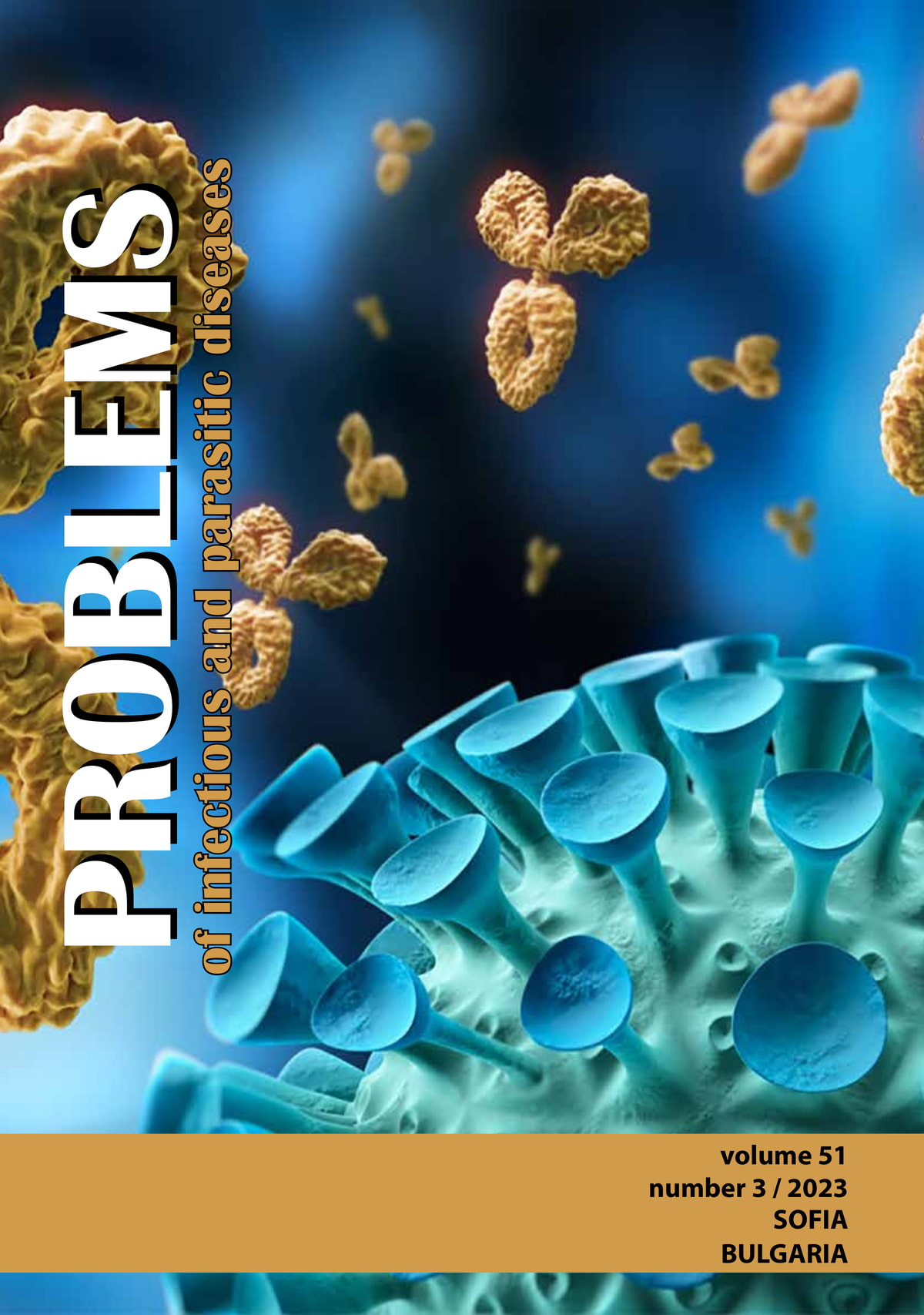MOLECULAR VIROLOGICAL ANALYSIS OF THE TRANSMISSION CLUSTERS AND RESISTANCE MUTATIONS OF HIV-1 SUBTYPE B IN BULGARIA (2012-2020)
DOI:
https://doi.org/10.58395/ye8wd203Keywords:
HIV-1, Subtype B, Drug resistance, Transmission clustersAbstract
HIV-1 infection in Bulgaria is known for its high level of genetic diversity. Previous studies have indicated that subtype B is the most common strain in Bulgaria, particularly among men who have sex with men, who are at a high risk of transmission. The primary objective of this study was to identify any transmission clusters and transmission resistance in individuals newly diagnosed with HIV-1 who have not yet received antiretroviral therapy (ART).
To this end, we sequenced the HIV-1 pol gene in the samples from the study participants using either the Viroseq HIV-1 Genotyping Test (Abbott) and the Applied Biosystems 3130xl genetic analyzer or the TruGene DNA Sequencing System (Siemens Healthcare) and an OpenGene DNA sequencing system. We then subtyped the HIV-1 pol sequences, and further analyzed those that met the criteria for subtype B.
The study included a total of 595 HIV-1 subtype B sequences. Our analysis revealed that the majority of those diagnosed with HIV-1 subtype B were male and lived in Sofia region. The most common transmission mode was through sexual intercourse among men who have sex with men, followed by heterosexual transmission. We also observed the presence of multiple transmission clusters , and a low percentage of transmitted drug resistance mutations (TDRMs). Overall, our study confirms that HIV-1 subtype B remains the most dominant strain in Bulgaria.
Downloads
References
Alexiev I, Beshkov D, Shankar A, Hanson DL, Paraskevis D, Georgieva V, Karamacheva L, Taskov H, Varleva T, Elenkov I, et al. Detailed molecular epidemiologic characterization of HIV-1 infection in Bulgaria reveals broad diversity and evolving phylodynamics. PLoS One. 2013, 8, e59666. https://doi.org/10.1371/journal.pone.0059666
Alexiev I, Shankar A, Wensing AMJ, Beshkov D, Elenkov I, Stoycheva M, Switzer WM. Low HIV-1 transmitted drug resistance in Bulgaria against a background of high clade diversity. J. Antimicrob. Chemother. 2015, 70(6), 1874-1880. https://doi.org/10.1093/jac/dkv011
Alexiev I, Mavian C, Paisie T, Ciccozzi M, Dimitrova R, Gancheva A, Kostadinova A, Seguin-Devaux C, Salemi M. Analysis of the origin and dissemination of HIV-1 subtype C in Bulgaria. Viruses. 2022, 14, 263. https://doi.org/10.3390/v14020263
Alexiev I, Shankar A, Dimitrova R, Gancheva A, Kostadinova A, Teoharov P, Golkocheva E, Nikolova M, Muhtarova M, Elenkov I, et al. Origin and spread of HIV-1 in persons who inject drugs in Bulgaria. Infect. Genet. Evol. 2016, 46, 269–278. https://doi.org/10.1016/j.meegid.2016.05.029
Alexiev I, Lo Presti A, Dimitrova R, Foley B, Gancheva A, Kostadinova A, Nikolova L, Angeletti S, Cella E, Elenkov I, et al. Origin and spread of HIV-1 subtype B among heterosexual individuals in Bulgaria. AIDS Res. Hum. Retrovir. 2018, 34, 244–253. https://doi.org/10.1089/AID.2017.0167
Alexiev I, Campbell E, Knyazev S, Pan Y, Grigorova L, Dimitrova R, Partsuneva A, Gancheva A, Kostadinova A, Seguin-Devaux C, et al. Molecular epidemiology of the HIV-1 Subtype B sub-epidemic in Bulgaria. Viruses. 2020, 12, 441. https://doi.org/10.3390/v12040441
Alexiev I, Campbell EM, Knyazev S, Pan Y, Grigorova L, Dimitrova R, Partsuneva A, Gancheva A, Kostadinova A, Seguin-Devaux C, Elenkov I,Yancheva N, Switzer WM. Molecular eEpidemiological analysis of the origin and transmission dynamics of the HIV-1 CRF01_AE sub-epidemic in Bulgaria. Viruses. 2021, 13, 116. https://doi.org/10.3390/v13010116
Alexiev I, Shankar A, Pan Y, Grigorova L, Partsuneva A, Dimitrova R, Gancheva A, Kostadinova A, Elenkov I, Yancheva N, et al. Transmitted HIV Drug Resistance in Bulgaria Occurs in Clusters of Individuals from Different Transmission Groups and Various Subtypes (2012–2020). Viruses. 2023, 15, 941. https://doi.org/10.3390/v15040941
90-90-90. An ambitious treatment target to help end the AIDS epidemic. UNAIDS / JC2684. 2014. Joint United Nations Programme on HIV/AIDS (UNAIDS). Available online: https://www.unaids.org/sites/default/files/media_asset/90-90-90_en.pdf (accessed on 20 September 2023).
HIV drug resistance strategy, 2021 update. Geneva: World Health Organization; 2021. License: CC BY-NC-SA 3.0 IGO. Available online: https://apps.who.int/iris/bitstream/handle/10665/343175/9789240030565-eng.pdf?sequence=1&isAllowed=y (accessed on 20 October 2023).
McClung RP, Atkins AD, Kilkenny M, Bernstein KT, Willenburg KS, Weimer M, Robilotto S, Panneer N, Thomasson E, Adkins E, et al. Response to a large HIV outbreak, Cabell County, West Virginia, 2018-2019. Am J Prev Med. 2021, 61(5 Suppl 1), 143–150. https://doi.org/10.1016/j.amepre.2021.05.039
Struck D, Lawyer G, Ternes AM, Schmit JC, Bercoff D. COMET: adaptive context-based modeling for ultrafast HIV-1 subtype identification. Nucleic Acids Research. 2014, 42, 18, e144.https://doi.org/10.1093/nar/gku739
Peña ACP, Faria NR, Imbrechts S, Libin P, Abecasis AB, Deforche K, Gomez A, Camacho RJ, de Oliveira T, Vandamme A-M. Automated subtyping of HIV-1 genetic sequences for clinical and surveillance purposes: Performance evaluation of the new REGA version 3 and seven other tools. Infectious Genetics and Evolution. 2013; 19:337-48. https://doi.org/10.1016/j.meegid.2013.04.032
Schultz AM, Zhang M, Bulla I, Leitner T, Korber B, Morgenstern B, Stanke M. jpHMM: Improving the reliability of recombination prediction in HIV-1, Nucleic Acids Research.2009,37, 2, W647–W651. https://doi.org/10.1093/nar/gkp371
Katoh K, Rozewicki J, Yamada K. MAFFT online service: multiple sequence alignment, interactive sequence choice and visualization. Briefings in Bioinformatics. 2019,20, 4, 1160–1166. https://doi.org/10.1093/bib/bbx108
Kuraku S, Zmasek C, Nishimura O, Katoh K. aLeaves facilitates on-demand exploration of metazoan gene family trees on MAFFT sequence alignment server with enhanced interactivity, Nucleic Acids Research. 2013, 41, W1, W22–W28. https://doi.org/10.1093/nar/gkt389
Larsson A. AliView: a fast and lightweight alignment viewer and editor for large datasets. Bioinformatics. Oxford, England. 2014, 30(22), 3276–3278. https://doi.org/10.1093/bioinformatics/btu531
Los Alamos HIV Sequence Database. Available online: https://www.hiv.lanl.gov/ (accessed on 10 September 2023).
Order № 47 from 11 December 2009 on the conditions and procedure for testing, notificating and reporting of the acquired immunodeficiency syndrome virus infection. Available online: https://www.mh.government.bg/media/filer_public/2015/04/20/naredba47-ot-11-12-2009g-virus-na-sindrom-na-pridobita-imunna-nedostatachnost.pdf (accessed on 08 October 2023).
Downloads
Published
Issue
Section
License
Copyright (c) 2024 Lyubomira Grigorova, Alexandra Partsuneva, Reneta Dimitrova, Asya Kostadinova, Ivailo Alexiev (Author)

This work is licensed under a Creative Commons Attribution 4.0 International License.





